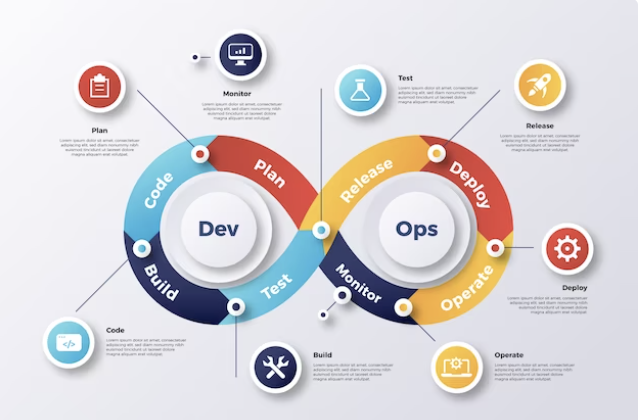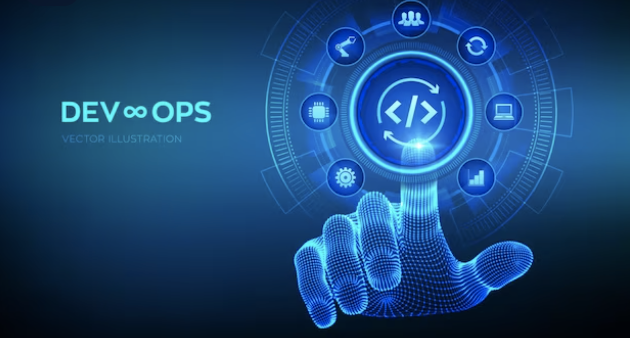Introduction
In today’s rapidly evolving digital landscape, the role of a DevOps engineer has become more pivotal than ever. These skilled professionals act as the bridge between development and operations teams, ensuring a seamless collaboration that leads to rapid innovation and the delivery of top-notch software products to the market. As the demand for DevOps engineers continues to rise across the United States, many individuals aspire to embark on this rewarding career path. But how can you become a DevOps engineer in the USA?
DevOps Engineer Skill Set

In the dynamic world of DevOps, a diverse skill set is the linchpin that enables DevOps engineers to bridge the gap between development and operations successfully. Beyond technical proficiency, DevOps engineers possess a unique combination of soft skills that make them invaluable assets in the realm of software development and operations. In this chapter, we’ll delve into the essential skills that define a DevOps engineer’s profile.
Analyzing the Essential Skill Set
DevOps engineers are known for their versatility, and their skill set reflects this adaptability. Let’s explore the core skills that make DevOps professionals indispensable:
Scripting and Coding Skills:
Proficiency in scripting languages like Python, Ruby, and Shell is paramount for DevOps engineers. These languages empower them to write automation scripts, create custom solutions, and integrate tools seamlessly.Configuration Management:
Tools like Ansible, Puppet, and Chef are staples in a DevOps engineer’s toolkit. They use these tools to automate and manage system configurations, ensuring consistency and reproducibility.Containerization and Orchestration:
With the rise of containerization technologies like Docker and orchestration platforms like Kubernetes, DevOps engineers must possess expertise in managing containerized applications and microservices.Cloud Computing:
Many modern projects leverage cloud platforms like AWS, Azure, or Google Cloud. Familiarity with these platforms, including infrastructure as code (IAC) practices, is essential for DevOps engineers.Collaboration Tools:
Proficiency in collaboration tools such as Slack, JIRA, Confluence, and version control systems like Git enables effective communication, project management, and code collaboration.Security Awareness:
DevOps engineers must understand security best practices to embed security throughout the development lifecycle. This includes securing code, containers, and infrastructure.Problem-Solving Prowess:
Rapid troubleshooting and problem resolution are key skills. DevOps engineers are adept at identifying issues, diagnosing root causes, and implementing solutions to minimize disruptions.
Technical Proficiency and Soft Skills
While technical skills are foundational, soft skills are equally vital for DevOps engineers:
- Effective Communication: DevOps engineers act as bridges between development and operations teams. Effective communication is essential for conveying ideas, addressing concerns, and fostering collaboration.
- Teamwork and Collaboration: DevOps emphasizes breaking down silos. DevOps engineers are team players who work closely with developers, operations staff, and other stakeholders to achieve common goals.
- Adaptability: The technology landscape evolves rapidly. DevOps engineers must adapt to new tools, practices, and industry trends to remain effective.
- Critical Thinking: DevOps engineers are problem solvers. They analyze complex issues, identify root causes, and devise innovative solutions to improve processes and system performance.
- Continuous Learning: DevOps engineers are committed to continuous learning. They stay updated on emerging tools, practices, and technologies to remain at the forefront of their field.
- Strategic Thinking: DevOps engineers align their efforts with overall business goals and objectives. This strategic perspective ensures that DevOps practices drive tangible value for the organization.
The combination of technical proficiency and soft skills makes DevOps engineers versatile professionals who can navigate the complex landscape of software development and operations. They excel not only in automating processes but also in fostering collaboration, innovation, and problem-solving.
Tools Used By a DevOps Engineer
In the world of DevOps, tools are the building blocks of efficiency, automation, and collaboration. DevOps engineers leverage a versatile toolkit to streamline processes, enhance productivity, and ensure seamless integration and deployment of software. In this chapter, we’ll explore the common tools and technologies that DevOps engineers utilize, highlighting their adaptability to diverse tech stacks.

A Toolkit for Efficiency and Automation
DevOps engineers are often referred to as “automation architects” because their role revolves around automating repetitive tasks, eliminating manual interventions, and optimizing workflows. Here are some of the fundamental categories of tools used by DevOps professionals:
Version Control Systems (VCS):
VCS like Git, Mercurial, and Subversion are at the core of collaborative software development. DevOps engineers use these tools to manage and track changes in source code, ensuring version control and collaboration.Continuous Integration/Continuous Deployment (CI/CD) Tools:
CI/CD tools like Jenkins, Travis CI, and CircleCI automate the building, testing, and deployment of software. DevOps engineers set up and configure these pipelines to ensure code changes are thoroughly tested and seamlessly deployed.Configuration Management Tools:
Tools such as Ansible, Puppet, and Chef enable DevOps engineers to automate and manage system configurations. They use these tools to ensure that servers and infrastructure are consistent and reproducible.Containerization and Orchestration Tools:
Containers, facilitated by Docker, have revolutionized software deployment. Kubernetes, Docker Swarm, and Amazon ECS are container orchestration tools that DevOps engineers use to manage and orchestrate containerized applications and microservices.Cloud Services:
With the rise of cloud computing, DevOps engineers frequently work with cloud platforms like Amazon Web Services (AWS), Microsoft Azure, and Google Cloud Platform (GCP). They use these platforms to provision and manage resources, leverage infrastructure as code (IAC) practices, and ensure scalability.Monitoring and Logging Tools:
DevOps engineers rely on monitoring tools like Prometheus, Grafana, and Nagios to continuously assess system performance. Logging tools such as ELK Stack (Elasticsearch, Logstash, Kibana) help them collect and analyze log data for troubleshooting and optimization.Collaboration and Communication Tools:
Effective communication is key in DevOps. Tools like Slack, Microsoft Teams, and Atlassian’s Confluence and JIRA enhance collaboration among development and operations teams.Security Scanning and Compliance Tools:
Security is a paramount concern. DevOps engineers use tools like OWASP ZAP and Nessus for vulnerability scanning and compliance checks, ensuring the security of software and infrastructure.
Common Programming Languages:
While not tools in the traditional sense, programming languages like Python, Ruby, and Shell scripting are essential skills for DevOps engineers. They use these languages to write automation scripts, create custom solutions, and integrate tools.
Adaptability to Diverse Tech Stacks:
One of the remarkable qualities of DevOps engineers is their adaptability to diverse tech stacks. Whether you’re working with a Java-based application, a Node.js server, or a database-driven system, DevOps principles and tools can be applied effectively.
Key Roles and Responsibilities of a DevOps Engineer
To truly understand the demand for DevOps engineers in the USA, it’s essential to explore the roles and responsibilities they undertake in the realm of modern software development and operations. In this chapter, we’ll delve into the core responsibilities of DevOps engineers and how they contribute to project efficiency and innovation.

Defining the DevOps Engineer’s Role
DevOps engineers are the architects of seamless collaboration between development and operations teams. They break down traditional silos and introduce a culture of automation, continuous integration, and rapid deployment. Here are their core responsibilities:
Automation and Continuous Integration/Continuous Deployment (CI/CD):
DevOps engineers design, implement, and manage CI/CD pipelines. These pipelines automate code integration, testing, and deployment, resulting in faster and more reliable releases.Infrastructure Management:
Whether it’s on-premises servers or cloud-based resources (AWS, Azure, Google Cloud), DevOps engineers optimize and manage infrastructure. They ensure it’s scalable and supports the application’s needs.Monitoring and Incident Response:
Proactive monitoring is a DevOps hallmark. Engineers continuously monitor system performance, analyze logs, and set up alerts to detect anomalies. When incidents occur, they respond swiftly, troubleshoot, and implement solutions to minimize downtime.Collaboration Facilitation:
DevOps engineers foster collaboration between development and operations teams. They facilitate communication, streamline workflows, and ensure both sides work together efficiently.
Core Responsibilities in Software Development and Operations
DevOps engineers bring a unique blend of skills and responsibilities to the table. Here’s how their roles contribute to project efficiency and innovation:
Efficiency Through Automation:
By automating manual tasks and streamlining processes, DevOps engineers increase efficiency. This results in shorter development cycles and quicker time-to-market for software.Enhanced Collaboration:
Siloed departments can hinder progress. DevOps engineers break down these barriers, fostering cross-functional teamwork that leads to innovation.Reliability and Stability:
Through infrastructure management and proactive monitoring, DevOps engineers ensure system reliability. This stability allows development teams to focus on innovation rather than firefighting.Continuous Improvement:
DevOps is all about continuous improvement. Engineers identify bottlenecks, analyze data, and implement changes to enhance project performance continually.
DevOps engineers are change agents, driving projects towards success through their automation expertise, infrastructure management, and collaboration skills. Their impact is felt in the efficiency of software development and the ability to innovate with confidence.
Also read: How to Stay Up-to-Date on the Latest DevOps Trends in the USA
DevOps Engineer Salary in the US (For Freshers and Experienced Professionals)

Salary is a significant factor that reflects the demand for DevOps engineers in the USA. As organizations increasingly recognize the value of DevOps practices, the compensation for skilled professionals has become competitive. In this chapter, we’ll delve into the DevOps engineer salary landscape, considering both freshers and experienced professionals.
Salary Trends for Freshers
For fresh graduates and those entering the field of DevOps, salaries are attractive. Entry-level DevOps engineers in the USA can expect competitive compensation packages that reflect the demand for their skills. The average starting salary for freshers typically ranges from $80,000 to $110,000 per year.
Factors Influencing DevOps Engineer Salaries
Several factors influence the salary of DevOps engineers:
Experience:
The level of experience significantly impacts salaries. Junior DevOps engineers with one to three years of experience earn less than their mid-level and senior counterparts.Location:
Salary levels vary across different regions of the USA. Metropolitan areas with a high cost of living tend to offer higher salaries to compensate for expenses.Company Size:
Large corporations and tech giants often offer higher salaries compared to smaller companies and startups.Industry:
The industry in which a DevOps engineer works can also affect compensation. For instance, the finance and healthcare sectors may offer higher salaries due to the complexity of their systems and regulatory requirements.Certifications:
Holding relevant certifications, such as AWS Certified DevOps Engineer or Certified Kubernetes Administrator, can positively impact salary negotiations.
A Comparative Look at Compensation
Junior DevOps Engineer (1-3 years of experience): The salary for junior DevOps engineers typically ranges from $80,000 to $110,000 per year.
Mid-Level DevOps Engineer (4-6 years of experience): Mid-level professionals can expect salaries ranging from $110,000 to $140,000 annually.
Senior DevOps Engineer (7+ years of experience): Senior DevOps engineers with extensive experience can command salaries upwards of $140,000 per year, with the potential for six-figure bonuses.
It’s essential to note that these figures are approximate and can vary based on individual circumstances, negotiation skills, and specific job requirements. DevOps engineers are well-compensated, reflecting their role’s significance in driving innovation and efficiency in software development and operations.
Education Requirements to Get DevOps Jobs in America

DevOps is a dynamic field that values practical skills and experience alongside formal education. In this chapter, we’ll explore the educational pathways to secure DevOps jobs in America, examining degrees, certifications, and training programs that can enhance your qualifications.
Bachelor’s Degree in Computer Science or Related Field
Many DevOps professionals hold a bachelor’s degree in computer science, information technology, or a related field. A bachelor’s degree provides a strong foundation in computer science principles, software development, and system administration. While not always a strict requirement, having a bachelor’s degree can make you a more competitive candidate for DevOps roles.Master’s Degree in Computer Science (Optional)
For those looking to advance their education further, a master’s degree in computer science or a related discipline can provide a deeper understanding of software engineering, cloud computing, and system architecture. While not essential for most DevOps positions, a master’s degree can be advantageous for career progression or specialized roles.DevOps Certifications
DevOps certifications are valuable credentials that demonstrate your expertise in specific DevOps tools and practices. Some widely recognized DevOps certifications include:AWS Certified DevOps Engineer:
Focused on Amazon Web Services (AWS) DevOps practices, this certification validates your knowledge of AWS tools and services in a DevOps context.Certified Kubernetes Administrator (CKA):
Kubernetes is a critical technology in container orchestration. CKA certification showcases your Kubernetes proficiency.Certified Jenkins Engineer:
Jenkins is a popular CI/CD tool. This certification demonstrates your mastery of Jenkins automation.Docker Certified Associate:
Docker is a fundamental technology in containerization. This certification confirms your Docker expertise.Certified DevOps Professional (CDP):
A vendor-neutral certification that covers various DevOps concepts and tools.Certified Information Systems Security Professional (CISSP):
For DevOps professionals specializing in security, CISSP certification validates your security knowledge.
Training Programs and Bootcamps
Several organizations and online platforms offer DevOps training programs and bootcamps. These programs provide hands-on experience with DevOps tools and practices and can be an efficient way to gain practical skills quickly.Continuous Learning
DevOps is a rapidly evolving field, and continuous learning is essential to stay updated with new tools and best practices. Attend conferences, webinars, and workshops, and engage in online communities to expand your knowledge.
Balancing Formal Education with Practical Experience
While formal education and certifications are valuable, practical experience is equally crucial in DevOps. Hands-on experience working with DevOps tools, building and managing CI/CD pipelines, and collaborating with cross-functional teams will enhance your qualifications and make you a more attractive candidate for DevOps roles.
Also read: A Beginner’s Guide to DevOps: Understanding, Implementing, and Thriving – US Guide
Conclusion
In closing, the journey to becoming a DevOps engineer in the USA is an exciting one filled with opportunities for growth and innovation. The demand for DevOps professionals continues to rise, making it a promising career choice. Embrace the challenges, be adaptable, and never stop learning. With dedication and passion, you can thrive in the world of DevOps and contribute to the future of software development and operations.
Your DevOps journey begins here, and the possibilities are limitless. Best of luck on your path to becoming a successful DevOps engineer in the USA!



















